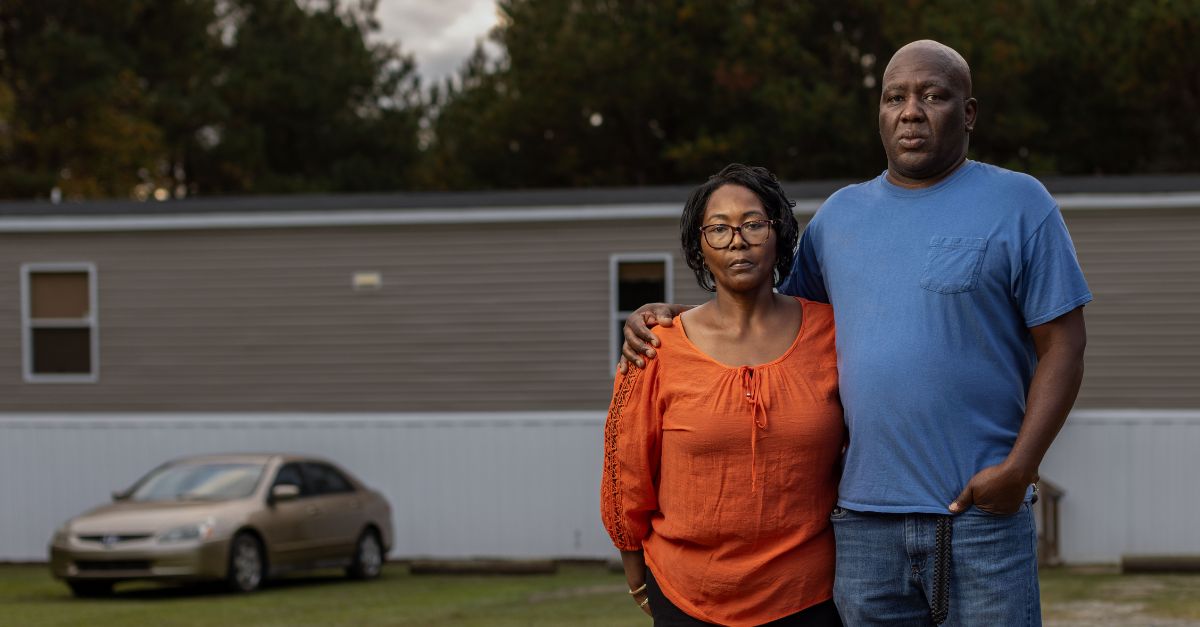
Avery Marshall (Right) and Alisa Carr (Left) stand outside their home in Willard, NC (Image courtesy of Institute for Justice).
A lawsuit has been filed by a North Carolina family against two sheriff’s offices for the destruction of their Pender County home and the trauma inflicted on them during a mistaken SWAT team raid.
Alisa Carr and her fiance Avery Marshall recounted how officers swarmed their residence in April 2024, employing flash-bang grenades, breaking windows, and pointing guns at their children while they were being ushered out of their rooms for questioning.
According to the family’s complaint from April 1, the incident, which they described as a “terrifying ordeal,” took place shortly after midnight on April 10, 2024, and was partially captured on video footage.
Officers from the sheriff’s offices of Lee County and Pender County stormed into the family’s quiet home, shouting profanities, shattering a glass door, busting through a metal door, and detonating flash-bang grenades. Officers made Avery lie face-down, shirtless, on top of the shattered glass with a gun pointed at his head. An officer also stepped on Avery’s back, on exposed stitches where Avery had recently undergone back surgery.
The family’s children, aged 9 and 16, were not spared the ordeal either, according to the complaint.
The filing alleged that “officers removed the kids from their bedrooms and threatened them with military-grade firearms,” while their parents “begged the officers to stop.”
According to the complaint, one officer “handcuffed Avery and yanked him to his feet, reinjuring his back,” while others “interrogated each family member like a criminal, about a person they did not know and had never seen before.”
The family said that during the interrogation, officers aimed a firearm at Carr while interrogating her in the “cloud of fumes from the flash-bang grenades.” Carr, who had previously suffered heart attacks, said she felt similar cardiac symptoms and told officers she could not breathe. Meanwhile, they said, police ordered the children out of their bedrooms and interrogated them at gunpoint in a police wagon outside the house.
More from Law&Crime: FBI SWAT team raided wrong home, but didn’t pay for damages and now SCOTUS has questions
Ultimately, police called an ambulance for Carr, then, “ransacked the whole house, damaging the house and furniture.”
Plaintiffs said that when Marshall asked officers who would pay for the property damage, he was told it would be the family’s responsibility, and that, “they should consider themselves fortunate that the officers hadn’t caused more damage.”
The family said in its filing that the incident, which has left them both physically injured and “psychologically scarred,” was “not an honest mistake.” Rather, they said, officers had been looking for a suspect in a series of vehicle robberies and obtained a warrant based on “false and misleading information.”
According to the Institute for Justice, the advocacy group representing the family, the suspect was found and arrested in another county the next day.
The family says the home is still badly damaged, and that they cannot afford the over $11,000 in repairs needed.
The lawsuit filed in federal court in North Carolina names Pender County, Pender County Sheriff Alan Cutler, Lee County, Lee County Sheriff Brian Estes and several deputies as defendants.
But plaintiffs say that police targeted the home because they saw a Nissan sedan — the car they believed the suspect to be driving — parked in front of the house. However, the Nissan officers saw was registered to Carr at her address, and was a different year and model and had a different license plate and VIN than the suspect’s vehicle. Carr and Marshall said that officers falsely told the magistrate that the suspect’s car and the car at their home was one and the same.
“The officers did not do their due diligence before conducting this raid, and they misled the magistrate into issuing the warrant without probable cause,” said IJ Attorney Marie Miller in a statement. “Nissans are one of the most common cars. If police had taken a minute to observe or look up basic information about Alisa’s car, this entire traumatizing raid would have been avoided.”
“The worst part of this whole nightmare was laying on the ground, not being able to do anything, while cops have an AR pointed in my son’s face. All I could do was yell ‘he’s 9-years-old’,” said Marshall. “I still lose sleep over it, and I know he does too.”
Another case involving a wrong-house raid is currently before the United States Supreme Court. That case, which involves a Georgia family whose home was mistakenly raided by an FBI SWAT team, has been fast-tracked for oral argument before the justices. There, officers conducted a raid on the wrong home after their GPS directed the to a similar-looking house in the same neighborhood as their target destination. Though officers admit their error, they argue that they are entitled to immunity from the family’s lawsuit and are not responsible for the damages to the home.
Love true crime? Sign up for our newsletter, The Law&Crime Docket, to get the latest real-life crime stories delivered right to your inbox.












